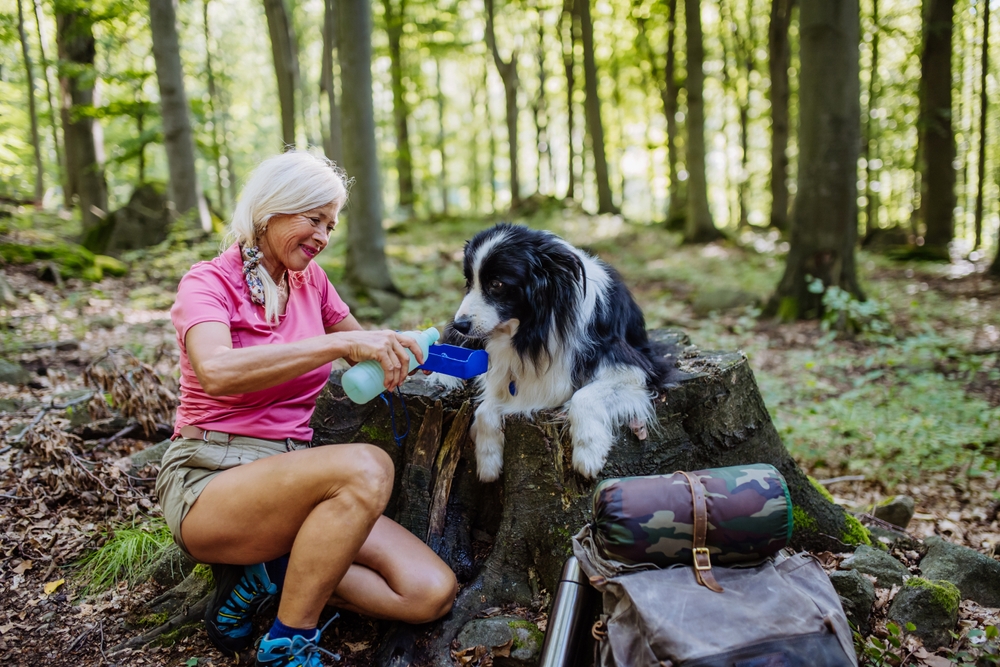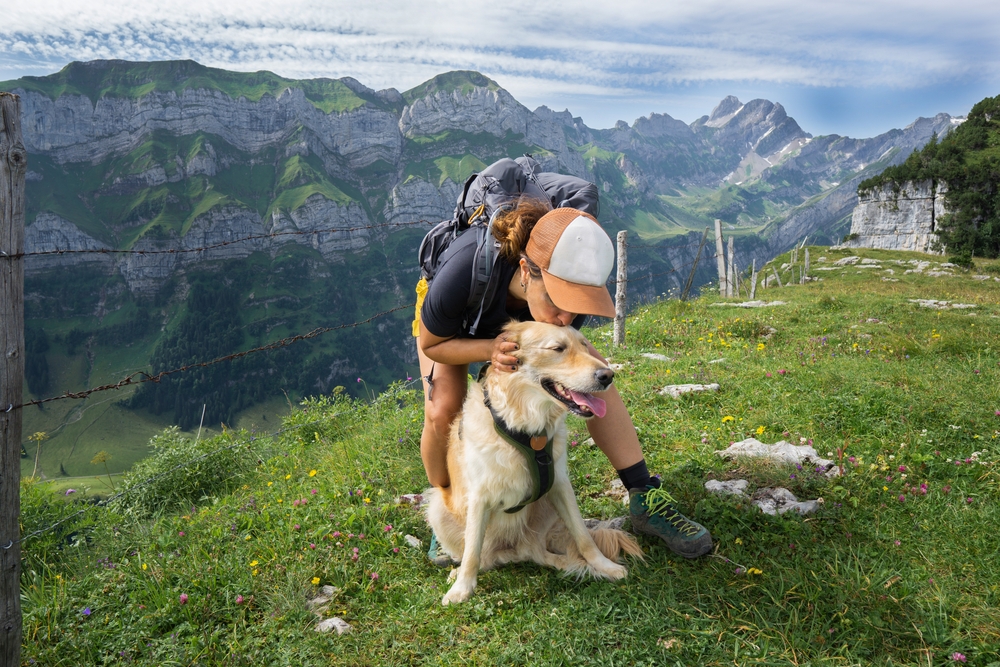Hiking with your pet can be one of the most enjoyable ways to explore the natural beauty of the Bay Area—from coastal trails and redwood forests to foothills and open space preserves. But while the views are stunning, the trails can also pose unexpected hazards for your pet.
At Omega Veterinary Group in San Mateo, we regularly help pet owners address issues caused by outdoor exposures—many of which are completely preventable. Whether you’re a seasoned hiker or just getting started with trail adventures, this guide is here to help you spot and avoid the most common (and dangerous) risks to your pet’s health on the trail.
Wildlife Encounters: Predators, Snakes, and Other Trail Dangers
Coyotes, Mountain Lions, and Bobcats
These predators live throughout the Bay Area—even in suburban neighborhoods. Pets, especially small dogs and cats, can become easy targets if off-leash or left unsupervised.
What to do:
- Keep pets leashed at all times.
- Avoid hiking at dawn or dusk, when predators are more active.
- If you encounter a predator, do not run. Pick up your small dog, make yourself look big, and back away slowly.
Rattlesnakes
Rattlesnakes are common in dry, rocky areas. A curious nose or paw can easily provoke a bite.
If your dog is bitten:
- Stay calm and carry your dog if possible.
- Seek emergency veterinary care immediately.
- Ask your vet about the rattlesnake vaccine as an added layer of protection for dogs who hike often.
Learn more about rattlesnake safety here.
Scorpions, Spiders, and Insects
Bay Area trails may also harbor black widow spiders or scorpions. Bites or stings can cause pain, swelling, and allergic reactions.
Prevention tips:
- Keep pets on the trail—avoid poking around in wood piles, rocks, or underbrush.
- Inspect paws and limbs after hikes.
Birds of Prey
Large raptors like hawks and owls can mistake small dogs or cats for prey. This is especially a risk in open spaces.
- Keep small pets on a short leash and close by.
- Avoid letting them wander in fields or unshaded areas.
Plants and Mushrooms: What’s Beautiful Can Be Dangerous
Toxic Plants to Avoid
- Poison oak – Causes skin irritation; can also spread to you via your pet’s fur.
- Oleander – Extremely toxic if ingested; even a small amount can affect the heart.
- Foxglove – Contains digitalis; can cause heart failure in pets.
Wild Mushrooms
The Bay Area’s mild, damp climate is ideal for mushrooms—including deadly species like Amanita phalloides (Death Cap).
Symptoms of mushroom poisoning:
- Vomiting, diarrhea
- Weakness or tremors
- Seizures
If you suspect mushroom ingestion, don’t wait—seek emergency care.
Check the ASPCA’s guide to toxic plants.
Water Dangers: Streams, Ponds, and the Pacific
Blue-Green Algae
Some lakes and ponds contain blue-green algae (cyanobacteria), especially during hot months. It looks like green paint or scum on the water’s surface—and it can be fatal if ingested.
Read more about blue-green algae toxicity.
Leptospirosis
This bacterial infection spreads through water contaminated with wildlife urine. It’s common in puddles, streams, or wet grass—especially in areas frequented by raccoons or rodents.
- Symptoms: Fever, vomiting, lethargy, kidney or liver issues
- Prevention: Ask your vet about the leptospirosis vaccine
Learn more about leptospirosis here.
Ocean Water Risks
Drinking ocean water can lead to salt poisoning—causing vomiting, diarrhea, and dehydration.
Always bring clean, fresh water on your hikes and beach days, and discourage drinking from any natural sources.
Foxtails: One of the Bay Area’s Worst Hidden Dangers
What Are Foxtails?
Foxtails are seed heads from certain grasses that can burrow into your pet’s skin, nose, ears, eyes—even lungs. Left untreated, they can migrate internally and cause serious infection.
Common symptoms:
- Sudden sneezing or head shaking
- Swelling or limping
- Excessive licking or pawing at an area
Preventative tips:
- Avoid tall, dry grass—especially in summer.
- Use protective shields like OutFox for dogs that like to sniff everything.
- Check your pet thoroughly after every hike.
More on foxtail risks from UC Davis
Tick Troubles: Lyme Disease and Other Tick-Borne Illnesses
Ticks thrive in wooded or grassy areas and are common in Northern California. They can transmit diseases such as:
- Lyme disease
- Anaplasmosis
- Ehrlichiosis
Preventative Steps
- Use a veterinarian-recommended tick preventive.
- Perform a full-body tick check after every outing.
- Focus on ears, armpits, groin, and under the collar.
CDC Guide: Preventing Ticks on Pets
Lyme Disease in Dogs – AVMA
Heat Safety: Preventing Overheating on the Trail
Dogs don’t sweat like we do, and heatstroke can sneak up fast—especially on warm days.
Signs of heat stress:
- Excessive panting or drooling
- Bright red gums
- Lethargy or confusion
- Vomiting or collapse
Safety Tips:
- Hike early or late—avoid midday heat
- Carry plenty of water (for you and your pet)
- Use booties or cooling vests if hiking on hot surfaces
- Take frequent breaks in the shade

Hiking Checklist: Be Prepared
Make sure you’ve got the essentials before you hit the trail:
- Leash and secure harness
- Fresh water and collapsible bowl
- First aid kit for pets
- Protective booties
- Up-to-date flea, tick, and leptospirosis prevention
- ID tags and microchip
And just as important: practice recall training and teach your dog to avoid wildlife, mushrooms, and standing water.
Emergency Situations: When to Act Fast
Seek immediate veterinary care if your pet shows signs of:
- Difficulty breathing
- Seizure activity
- Uncontrolled bleeding
- Collapse or loss of consciousness
- Suspected toxin ingestion (e.g., mushrooms, algae, rat bait)
When in doubt, call your vet or nearest emergency clinic.
Need help? Contact Omega Veterinary Group for advice or emergency guidance.
Happy Trails, Safe Paws
The Bay Area is one of the most beautiful places in the world to explore with your dog. With a little preparation and some trail know-how, you can both enjoy unforgettable adventures—without the emergency vet visits.
At Omega Veterinary Group, we’re here to help keep your pet healthy, happy, and ready to explore. From wellness visits and vaccines to tick prevention and emergency care, we’ve got your back.
Schedule your next visit before your next outdoor adventure!







Leave A Comment